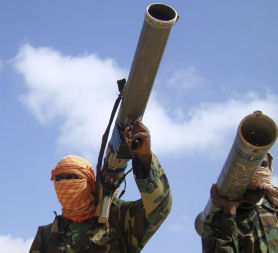Terrorism: a threat that spans the world
From the attacks on the United States on 9/11 to the growth of Islamist radicals in Yemen, the global terrorist threat has continued to grow despite the efforts of western intelligence agencies.

One of the most obvious and irritating changes of the last ten years has been the experience of travelling through an airport.
Liquids in bags. Shoes – on or off? Extra scanners at departure gates.
The threat of terrorism has always been with us, but since 11 September 2001 that threat has changed the daily lives of millions of people who now live on an ever-shifting front line of irregular warfare.
Five days after 9/11, President George Bush first used the phrase “war on terror”.
“This crusade – this war on terrorism – is going to take a while,” he told the American people.
The President went on to tell members of the US Congress that the war would not end “until every terrorist group of global reach has been found, stopped and defeated.”
Mr Bush later apologised for using the word “crusade”, and during the Obama years the phrase “war on terror” has largely fallen into disuse.
These days the Pentagon prefers talking about an “Overseas Contingency Operation” instead.
Terror threat
“War on terror” was felt to denote war in perpetuity, because terrorism will always be there. The phrase arguably opens the door to a series of potentially ill-defined military operations anywhere around the world, regardless of the strategic and human rights consequences, and that, of course, is the major criticism made of American and British foreign policy over the last ten years.
“War on terror” was felt to denote war in perpetuity, because terrorism will always be there.
Earlier this year I watched the former head of MI5, Dame Eliza Manningham-Buller, tell the Chilcott enquiry into the 2003 Iraq war that the conflict had made Britain less safe, encouraging radicalism at home and abroad.
The Afghan war is similarly controversial.
It began in 2001 with the ousting of the Taliban from power and the capture or killing of the Al Qaeda network behind the attacks on Washington and New York.
With these objectives largely achieved, Afghanistan has – like Iraq – become a pre-emptive war, its stated mission being to fight terrorism abroad so that it doesn’t have to be fought at home.
Meanwhile a vast multibillion dollar global defence and security industry has also been tasked with pre-emptive warfare, staying ahead of evolving and emerging threats.
At Channel 4 News we try to stay ahead of the curve in terms of where that terrorist threat is heading.
Global reach
We have covered stories from the front line of a conflict which stretches from the London Borough of Ealing to Somalia, and from the wilds of Pakistan back to London and New York.
Al Qaeda has morphed into a loose confederation of franchises and lookalike organisations with branches anywhere from Indonesia to Niger.
As for Al Qaeda, well it has morphed into a loose confederation of franchises and lookalike organisations with branches anywhere from Indonesia to Niger.
In the last couple of years, Somalia and Yemen have become particular interests of mine, so called ‘ungoverned space’ where Al Qaeda and its allies can operate.
In 2009 we broke the story of a suicide bomber who set out from Ealing to Somalia.
In 2010 I was in the Yemeni capital Sana’a, talking to British citizens at risk of radicalisation in local mosques. The spur for my trip was the arrest of a Nigerian man who had been trained in Yemen and was subsequently caught trying to blow up a passenger jet over Detroit.
The threat is truly global and is the dangerous flip-side of the world’s interconnectedness. It comes in the form of “home-grown” terrorists
The threat is truly global and is the dangerous flip-side of the world’s interconnectedness. It comes in the form of “home-grown” terrorists, small “sleeper” cells who plot in the shadows of major democracies and irregular armies who eke out an existence in some of the remotest corners on earth.
The problem is particularly acute in the Asian subcontinent, so you will find films here from Afghanistan, South Waziristan and the Indian city of Mumbai; and from Arizona, where the US test flies its pilotless drones designed to kill militants along the “Afpak” border.
The phrase “war on terror” may have been consigned to history, but the conflict surely has not.




